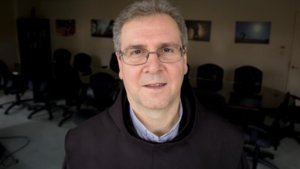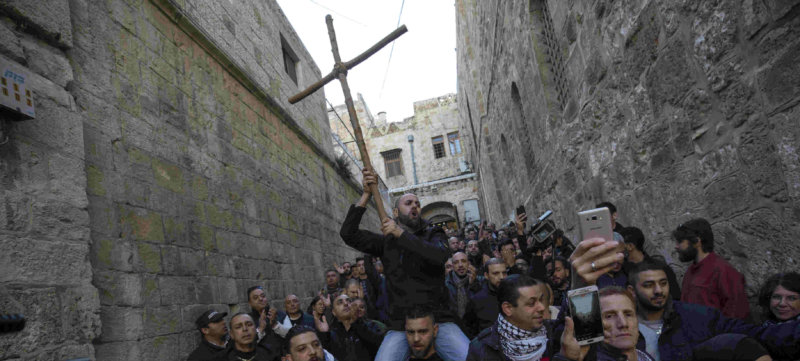
WASHINGTON — Some Christians would consider it a blessing to live in the land where Jesus Christ was born and lived.
But for some Christians who live with the daily reality and not the romanticism of the land where the faith originated, living as a religious minority in a place of conflict — often tied to religion — it is considered more of a “misfortune,” said Franciscan Father Francesco Patton, the head of the Holy Land Franciscans, also known as the custos, during a Nov. 7 event in Washington.
One of the roles of the Franciscan friars who tend to the dwindling flock of Christians there is to remind the “living stones,” as they often refer to Christians of the Holy Land, that theirs is a “special vocation,” he said.
“We have to insist that it is not a misfortune. It is a vocation and it is a special vocation strictly linked to the vocation of St. Ignatius (of Antioch). It is a martyrdom to be a Christian in the Middle East,” said Father Patton, an Italian Franciscan based in Jerusalem, who navigates with his soft-spoken manner the religious and political waters that come with life in the volatile area.
Part of Father Patton’s role as custos, a title similar to a provincial or superior, is to take the experience of Christians in the Middle East beyond the region’s borders and to speak of the good and the not-so-great about modern-day life in the land of Jesus’ birth, life and ministry, and nearby places where Christianity began to spread to others parts of the world.
From early to mid-November, he attended fundraising and other events at Washington’s Franciscan Monastery of the Holy Land, where part of the monastery’s role is to host programs aimed at educating others about the Middle East and the cultural and religious traditions of the region.
“It’s a very, very difficult area. It’s an area where the (Franciscan) friars for 801 years have tried to do bridge-building between cultures, bridge-building between religions, bridges that bring people together in Islam, Christianity and Judaism, to do the things that will be the foundation for any kind of peace settlement that comes to that area,” said Franciscan Father Larry Dunham, the Washington monastery’s guardian, or superior, speaking to a group of donors gathered for the custos’ visit in November.
“Any peace agreement, if it’s not built upon bridge-building efforts like the Franciscans are doing,” he continued, “it’s not going to work. … Bridge building between cultures and religions is what we (the Franciscans) have been about for 801 years and that’s the work I’m inspired by and am proud of.”
It is work that stretches back to St. Francis, the founder of the Franciscans, and his now famous meeting in Egypt with Sultan Malik al Kamil in 1219. St. Francis left Italy to meet with the sultan in Damietta, Egypt, during the Fifth Crusade and that meeting produced a dialogue about interfaith conflict, war and the search for peace.
Following in the footsteps of St. Francis, the Franciscan custos advocates internationally for peace among the inhabitants of the Holy Land, regardless of religion. In 2017, he was one of several religious leaders who welcomed U.S. President Donald Trump to Jerusalem’s Church of the Holy Sepulcher, one of the holiest sites in Christianity.
He later joined other religious leaders from Jerusalem to send Trump a letter expressing concerns about Washington’s involvement with Israel, which resulted in relocating the U.S. embassy from Tel Aviv to Jerusalem, a move that produced violence and added fuel to an already tense situation.
To counter some of those long-running and increasing tensions, the Holy Land Franciscans offer programs to help Christians and other underserved communities with education, housing and peace-building projects such as a music school called the Magnificat Institute, where Christian, Jewish and Muslim student musicians from Jerusalem perform together.
Such projects, said Father Patton, are “laboratories of peace.”
Beyond the Holy Land, Father Patton also oversees the work of friars in places like Jordan and Syria, where Franciscans not only have remained to serve the spiritual needs of Christians in a time of war, in places such as Damascus, Aleppo and Lattakiah, but now have a project to help children and other youth who have experienced war overcome psychological trauma, Father Patton said.
The Franciscans’ pastoral work in the war zone also includes helping Christians find employment and open up economic opportunities to stave off the Christian exodus from their ancestral lands.
“The pastoral work is to help other Christians understand how important it is for them and the rest of the population to have a Christian presence continue in all the countries of the Middle East,” he said.
Before the recent conflict broke out in 2001, Syria had more than 2.2 million Christians living there, but today they number less than 1 million. Christian pilgrims would visit locales such as the Memorial of St. Paul, the place where he converted to Christianity, and the house were Ananias baptized him. Both places are in or near Damascus, Syria, and are under the care of the Holy Land Franciscans there.
But the biggest challenge remains planting the seeds of reconciliation. One friar told Father Patton that it is “easier to rebuild a house than to rebuild coexistence,” particularly after a person has had a family member die during war, and “it is easier to hate others than to forgive.”
“But without reconciliation and without forgiveness, it is impossible to have a future,” said Father Patton.
The work of the Franciscans in the Holy Land has not gone unnoticed and “the good news is the number of young people asking to give their lives as a Franciscan in the Holy Land” has increased in the last three years, Father Patton said.
The efforts, however, can only be maintained with funding from places such as the United States, where benefactors such as those who gathered for the custos’ visit in Washington donate to maintain their projects.
“I am a Franciscan, so ours is the begging order. We (don’t) ask the poor, we ask the rich” for money, Father Patton said to laughter from those in the room.
But a big form of help that Christians outside can provide to those who remain in the troubled lands is moral support, Father Patton told Catholic News Service.
“The Christian presence is a minority … we are the little flock,” as Jesus used to say, Father Patton said. “When you are the little flock, often you feel that you are not so safe. The majority is, of course, more safe than the minority.”
The struggle for Christians in the Holy Land is great, but “we offer our weakness, our openness, our contributions” and try to be the leaven in a troubled area, Father Patton said. Christians outside of the Holy Land can show support by making a pilgrimage to the Holy Land, by donating to projects there, but also by advocating for them, particularly in places like Washington, where international policy is crafted.
“Since we are so small and since we are so weak, it is very important for us to feel that the Christians living in the different countries of the world, and in countries so important and so powerful (such as) the United States,” that Christians there are interested in their well-being, Father Patton said.
They need to know that someone cares and that when they are under attack by greater forces, “there is some intention to also sometimes, to defend, to protect us,” he said.
Copyright ©2018 Catholic News Service/U.S. Conference of Catholic Bishops.


